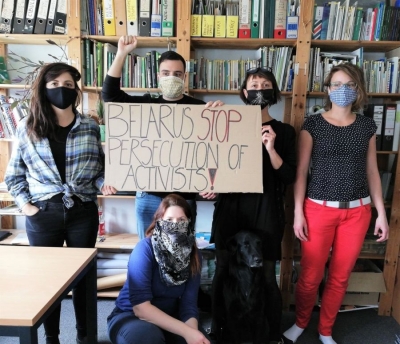In Belarus, 67 people were detained till May 2020 while peacefully protesting against a new accumulator plant. During the mass protests against the falsified presidential elections, the Belarusian government is persecuting activists of the anti-nuclear movement [3]. In Slovenia, citizens were deprived of the right to participate in the environmental impact assessments (EIA) of new dams. In Czechia, Poland, and Slovakia, activists have been punished within the last three years for organizing events to draw attention to climate change.
“Defending the environment is truly dangerous work. For years, we were used to hearing frightening stories from Latin America, Africa, or Asia. However, violence against activists also occurs in Europe. In the times of restrictions on civil freedoms due to global pandemic, we are registering even more cases of environmental damage and breaches of the rights of the local communities,” says Martin Skalsky, head of Arnika’s Citizens Support Centre. “The Aarhus Convention Compliance Committee is effective, but investigation of the cases takes several years. It is promising that the governments are preparing the Rapid Response Mechanism, which is supposed to provide endangered people with the necessary help.”
The Working Group of the Parties to the Aarhus Convention is meeting in Geneva and virtually on 28th-29th October. It will prepare the documents for final approval by the ministers of the environment of signatory countries at the Meeting of the Parties scheduled for the autumn of 2021 in Georgia. Thus, there is hope that the Rapid Response Mechanism could already start working next year.
Further reading:
[1] Global Witness revealed the highest number of land and environmental defenders murdered on record in a single year, with 212 people killed in 2019 for peacefully defending their homes and standing up to the destruction of nature.
ENG 29/7/2020 Defending Tomorrow (Global Witness)
[2] The UNECE Convention on Access to Information, Public Participation in Decision-making and Access to Justice in Environmental Matters was adopted on 25 June 1998 in the Danish city of Aarhus at the Fourth Ministerial Conference in the 'Environment for Europe' process. It entered into force on 30 October 2001. Details on the Convention are available here.
[3] Several activists from the Belarusian NGO Ecohome were detained recently for participating in unauthorized public assemblies and some of them were imprisoned for weeks. According to Arnika, the arrests of Irina Sukhy, Marina Dubina, and Alena Dubovik and attempts to detain other members of Ecohome appear to be related to the final phase of the preparations for the launch of a nuclear power plant near the village of Ostrovets.
ENG 2020 Arrest of Irina Sukhy: Belarus authorities exploiting the political turmoil to persecute environmental activists (Stop Persecution)
ENG 2020 Marina Dubina from Ecohome imprisoned. Arnika repeatedly calls for an end to the persecution in Belarus (Stop Persecution)
ENG 2020 Persecution of environmental activists in Belarus has no end. ‘Green Telephone’ operator Alena Dubovik was sentenced to 15 days in prison (Stop Persecution)


